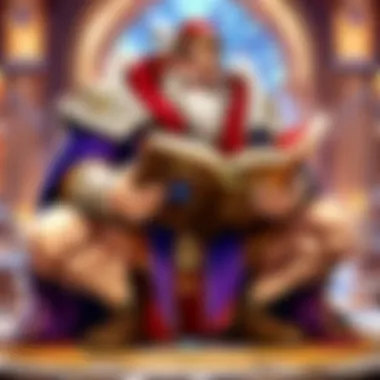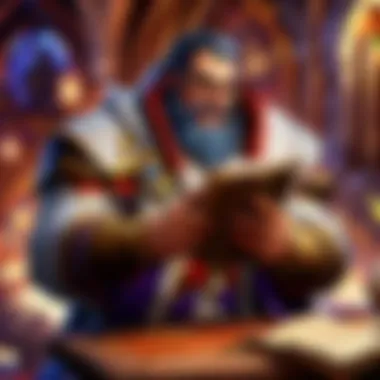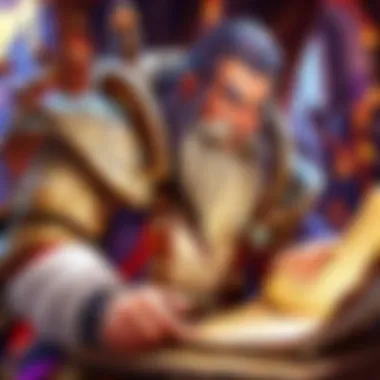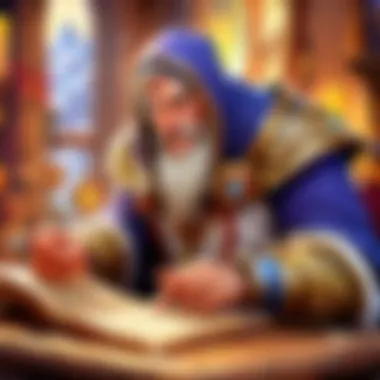The Voracious Reader's Journey in Hearthstone's Arena


Intro
The path of a voracious reader intertwines surprisingly well with the world of Hearthstone. This journey is not merely about the joy of reading but encompasses an understanding of strategy, character narratives, and ongoing evolution of the game. Regular readers tap into various literature forms, including novels, strategy guides, and thematic essays that propel their gameplay capabilities. More often than not, they construct not just powerful decks but richer foundational understandings of the game itself.
Deep reading facilitates broader outlooks, improving one’s grasp on associated subjects. Literature broadens perspective and enhances comprehension skills. These improvements feed seamlessly into game strategy, helping players bond with the ever-changing meta characteristically present in Hearthstone.
Now, let’s explore distinct sections that highlight crucial perspectives through the lens of reading and its synergy with discussing Deck Strategies and Player Profiles, setting adequate groundwork for experienced gameplay.
Game Updates and Patches
Staying current with Hearthstone's latest updates is critical for any aspiring player. Each patch often signifies pivotal changes in gameplay dynamics. Review these updates through the lens of evolving narratives and lore tied closely to card selections and mechanics.
Overview of the Latest Game Updates
Hearthstone frequently introduces updates trhat modify the very core of gameplay. For example, new balance changes not only adjust the availability of certain decks but also influence narrative arcs. Reading about lore embedded in updates can provide foundational support for certain strategic thinking as it relates to character development within matches.
Detailed Breakdown of Changes and Their Impact on Gameplay
Many such adjustments, often technical or meta-related, reshape gameplay. Comprehending these transitions from an informed standpoint can allow one to not only revel in strategic victories but explore satisfying thematic combinations. Here, literary analysis tools offer vital insights. Players might gain from reading forums where patch discussions focus on impactful strategies.
Analysis of New Cards and Mechanics Introduced
New cards can shift competitive landscapes drastically. Observing community reactions through articles or Reddit threads may familiarize one with strategic implications Air older decks utilize new cards effectively. Deductive reasoning through analysis mirrors literary critique; each new spread contributes echoes to developing storylines within gameplay.
Deck Strategies and Meta Analysis
Every voracious reader realizes the importance of sound strategies. Recognizing top decks and adaptability is crucial in shaping individual play experiences. While reading showcases various habits, evaluating play styles essentially crafts one’s identity within the gameplay community.
Top Deck Recommendations
Diverse styles demand an understanding of numerous recommended deck compositions. Expertise shines a light on adaptability and the increasing importance of shifting perspectives. Popular options and suggestions may help bridge gaps between various narratives. The analysis below contains some key deck recommendations:
- Aggro (Harness quick strategies)
- Control (Adapt through patience)
- Combo (Integrate multiple steps for victory)
Insight Into the Current Meta
Patience translates into hardened gameplay tactics. Awareness of the current meta helps players make necessary adjustments. Staying informed through multiple readings cultivates a base ground for creating diverse decks.
Strategies for Countering Popular Decks and Tech Choices
Mismatch of styles can come from being too rigid. Innovative reading tendencies with playing preferences highilgjt deck tech choices, meaning adapting to specifics before guided execution becomes necessary. Knowing how Teslainni’s shaman decks compete against Paladin’s can dictate expected victories continually.
Ending
Hearthstone here coexists beautifully with reading. The complex association reinforces Barth stone learning and responsiveness using fiavourful arc structures within our picks. Deep literature focused upon aids voracious readers in comprehending mechanics quickly while transferring learned strategies seamlessly. These endeavors shift gameplay tests indefinitely towards consistently winning tactics, extenuating our relationship, and readiness.
Intro to Voracious Reading
Reading extensively shapes the way one interacts with the material world, including gaming. In the realm of Hearthstone, a rich environment of strategic thinking emerges through the lens of literature. This section delves into the essence of voracious reading and how such practice not only fosters enjoyment but also enriches the cognitive landscape essential for mastering gameplay.
Defining a Voracious Reader
A voracious reader is not simply someone who consumes text voraciously; it is about depth and engagement. This reader immerses in worlds built by others, exposing themselves to diverse ideas, cultures, and strategies. In essence, a voracious reader is someone eager to explore a myriad of narratives and knowledge bases. This enthusiasm connects directly to understanding complex games like Hearthstone, where decisions must be informed and nuanced.
Some key traits of a voracious reader include:
- Curiosity: An instinct to question and expand their knowledge base.
- Diversity: Exploring various genres, from fantasy to strategy.
- Analysis: Reflecting on themes and structures to deepen comprehension.


In essence, identifying as a voracious reader anchors one in the habit of inquiry and exploration. It creates a robust foundation for synthesizing multiple viewpoints, fostering not just enjoyment but crucial strategic thinking.
The Cognitive Benefits of Extensive Reading
The act of reading has profound cognitive advantages, typically resulting in enhanced comprehension and problem-solving abilities. These benefits significantly align with the demands of strategic gaming like Hearthstone, where analyzing each card and situation is crucial.
Some cognitive gains from extensive reading are:
- Improved Vocabulary: Exposure to different writing styles enriches language proficiency, enhancing the player's communication within the game community.
- Critical Thinking: Analyzing characters and plots cultivates the ability to evaluate situations effectively, a vital skill in constructing effective Hearthstone decks.
- Memory Enhancement: Remembering intricate plots and character progressions aids in retaining game mechanics and strategies.
Extensive reading develops a habit of mind that promotes continuous learning, inquiry, and adaptability.
These cognitive strides transfer seamlessly into gaming. With each book explored, a reader evolves in their approach to gameplay. Overall, it is evident that voracious reading not only engages individuals but also systematically enhances their capacities as thoughtful and strategic Hearthstone players.
The Connection Between Reading and Gaming
In the context of Hearthstone, there exists a profound connection between reading and gaming. The way players approach their strategies can be significantly influenced by different forms of literature. This not only includes traditional novels but also guides that elucidate game strategies and analyses of various gaming trends. Engaging with a diverse set of readings equips players with a broader understanding, boosting their cognitive skills and strategic outlooks within the game. The analytical aspect of reading sharpens a player's ability to dissect their opponents' moves and understand the game's constantly changing meta.
Understanding Game Narratives
Game narratives form an essential part of any gaming experience, including Hearthstone. The game's storylines, themes, and character arcs present players with a narrative fabric that enriches the overall experience. Knowing the lore enables a player to connect with the game on a deeper level. Through characters like Arthas, Tyrion, and Jaina, players see distinct personalities that influence not just gameplay mechanics but also the player’s feelings about different decks and cards.
In gameplay, these narratives are often reflected in cards with unique abilities that resonate with their backstories.
While participating in Hearthstone, taking into account the game's narrative leads to more informed decision-making during matches. Consider how common archetypes align with certain narratives. Reading fiction or non-fiction that provides insights into strategic thinking can transpose these lessons into game mechanics effectively.
How Stories Influence Player Strategies
The ties between storytelling and gaming strategies run deep. Narratives not only inspire players but also shape the framework in which strategies are devised. For instance, players may develop their tactics based on archetypical heroes they aspire to embody or monstrous villains they aim to defeat. Stories present characters and conflicts which help develop affinity towards certain strategies.
Within the context of Hearthstone, players frequently draw parallels between a fictional lore and real-time decisions made in-game. Furthermore, various story conflicts often mirror real-life strategic dilemmas, allowing players to approach gameplay with a mindset refined through storytelling.
Several notable strategies emerge from understanding narratives:
- Character-driven Development: Players gravitate toward strategies associated with characters they resonate with, enhancing personal investment.
- Framework-Based Hypothesis Testing: Using principles seen in reading, players can formulate hypotheses about likely game outcomes and player's expected moves.
- Emotional Resonance: Decision making might change because the story creates emotional pressure or captive interest around a particular choice.
By analyzing narratives intrinsic to the game, players build a solid foundation for strategizing their gameplay. If a player comprehends the embedded intricacies of a card or a story theme, they can augment their performance. Consequently, an arsenal bolstered by reading material becomes vital for deepening a player's capacity for strategic thought and gameplay.
Literary Genres and Their Relation to Hearthstone
Exploring the ties between literary genres and Hearthstone reveals significant insights for both readers and players. Understanding how different genres contribute to player strategy and narrative can foster a more enriched gaming experience. Literary genres inform the themes, characters, and strategic elements that manifest in Hearthstone, elevating the game beyond mere mechanics. A voracious reader, interested in the interplay between literature and gaming, can significantly enhance understanding and gameplay.
Fantasy Novels and Their Influence
The fantasy genre provides a robust backdrop for understanding the thematic elements of Hearthstone. Works like J.R.R. Tolkien's The Lord of the Rings or C.S. Lewis's The Chronicles of Narnia offer imaginative worlds filled with intricate lore. This genre cultivates an appreciation for the art of world-building, which directly enhances players' engagement in Hearthstone. The complexities of card choices often reflect character archetypes established in this genre. A player might choose a spell card evocative of a fantasy sorcerer or a creature card that emulates mythical beasts.
Moreover, fantasy novels often contain rich character development. This depth informs players' approach to deck-building and strategy. Players who immerse themselves in the narratives of their favorite fantasy tales can draw parallels in Hearthstone, applying elements like strategy and personality traits to their gameplay decisions. Thus, a deep dive into fantasy literature correlates with smarter game tactics, reflecting on understanding of motivations and characteristics that influence their decks
Non-Fiction Insights on Strategy and Psychology
Non-fiction literature, particularly those delving into strategy and psychology, can greatly impact how a player approaches Hearthstone. Books like Super Better by Jane McGonigal or The Art of War by Sun Tzu provide lessons on power dynamics, mental resilience, and decision-making under pressure. Each of these concepts applies directly to the gaming world where strategic thinking can determine a player's success.
Reading strategy guides can aid in understanding the evolving meta of Hearthstone. They enable players to analyze game mechanics with informed perspectives. Understanding psychological elements, such as real-time analytics when to bluff or to play conservatively, becomes crucial as players navigate matches.
To not neglect emotional intelligence, literature exploring human behavior equips a player to read opponents. By understanding psychological nuances, players can adapt strategies. This complements original strategies drawn from gameplay while learning valuable lessons from narrated case studies within literature.
“Reading both fiction and non-fiction develops a player's capacity to identify opponents’ intentions, contributing to winning strategies.”
Reading Strategy Guides and Their Impact


Reading strategy guides has become an integral part of the gameplay experience in Hearthstone. These guides inform players about the complexity of the game mechanics and the nuances that go beyond mere card-use. Insights gained from literature on gameplay strategies bridge the gap between knowledge and application. They help craft intelligent gameplay experiences.
An effective strategy guide provides the player with tactical frameworks and situational awareness needed for success. The value of these guides lies not only in what is written but also how this knowledge translates into real-game scenarios.
Analyzing Game Mechanics Through Literature
Game mechanics form the backbone of Hearthstone. By understanding the rules and processes behind actions—like mana usage, card interactions, and turn-based strategies—players elevate their chances of victory. The analysis of game mechanics found in literature illuminates how to approach complex game scenarios.
Consider these important points when diving into literature on game mechanics:
- Basic Foundations: Mechanics such as resource management cannot be ignored. Understanding mana curve and gameplay flows empowers decision-making on which cards to play.
- Card Interaction: An intricate knowledge of how cards interact sequentially allows players to strategize effectively. Examples in guides often bring clarity to potential outcomes.
- Scenarios and Applications: Strategy guides also present potential scenarios that might occur in competitive play. Engaging with these predictions enhances adaptability.
“Understanding the underlying mechanics of a game transforms a player from a casual enthusiast into a strategic thinker.”
Through strategic analysis, a reader not only becomes informed but gains perspective on how to maneuver opponents in unique ways. This wealth of mechanical understanding feeds into player creativity, allowing for approaches that others might overlook.
Case Studies of Effective Deck Building
Deck building goes hand in hand with strategic reading. Effective decks resonate with styles learned through guides. Firstly, identifying synergy amongst cards is crucial. Guides often showcase decks that are successfully performing in current environments.
When examining case studies of effective decks, players can discover:
- Indicators of Success: Analyzing statistics of winning decks is important. Literature should provide details on strides made in constructive thinking. Those stats reflect effectiveness.
- Archetypes and Trends: Players discover specific archetypes—like aggro or control decks—through case studies, thus decoding patterns in competitor strategies.
- Self-Reflection and Adjustment: What worked in one context may not yield the same result later. Continuous reading helps a player learn to adjust tactics and strategies when new cards are introduced.
Effective guides illustrate both contemporary trends and historical context, creating an enriching educational experience for readers. Armed with this knowledge, players can create decks poised for traction in an ever-changing game.
Engagement with literature aids, fostering a versatile and informed Hearthstone player. Demonstrating balance in both reading and playing enhances one’s identity in the gaming community.
The Meta-Game: Staying Informed
The meta-game in Hearthstone often evolves rapidly. Staying updated with current trends greatly impacts one's performance in the game. A voracious reader, equipped with literature on gaming strategies and community analysis, stands at a distinct advantage. Current knowledge informs decision-making, helps devise effective strategies, and can even sway over one's understanding of the game at large.
The Importance of Current Knowledge
In Hearthstone, timing is crucial. The game's dynamics shift with new card introductions, rule changes, or even expansions. A player needs to stay ahead by consuming content that provides insight into which cards are in vogue and which strategies dominate the current meta. Without this, a player can easily become obsolete or fall behind in skill during crucial matches.
Research shows that dedicated readers often retain and analyze vast amounts of content, which improves their game performance. Familiarity with the tendencies of widely used decks can help anticipate opponents’ moves. Thus, knowledge gained through detailed reading and engagement with community content can shape techniques and strategies directly affecting outcomes in competitive settings.
Leaning into ongoing learning not just elevates gameplay; it connects players to the heart of the game culture.
Moreover, reading forums and articles further engages one with community insights, towards adapting strategies optimal for the game. As players adapt to new insights and modify their techniques, this reshapes the competitive landscape frequently.
Trends in Card Strategies and Adaptation
In today’s Hearthstone, understanding trends is critical. Participating actively in community discussions on platforms such as Reddit, one becomes exposed to evolving strategies and popular decks. Being aware of these trends allows players to focus their reading efforts on the right materials. Topics such as counter strategies, budget deck builds, and synergy explanations are regularly discussed.
Many players publish guides on sites like fb.com. These cover specifics and nuances of current popular decks, noting key cards that define high-ranking builds. It is important to delve deep into these resources.
Some common trends today can be categorized into:
- Aggro Decks: Focused on fast play and overwhelming the player.
- Control Decks: Emphasize managing the board before moving for a win.
- Combo Decks: Build towards a specific win through combining various crucial cards.
Recognizing these trends directly informs deck building and refining strategies while enhancing understanding ineffective plays against certain decks. Such current study not only enriches one's gameplay but creates waves of adaptation over time.
Thus, a reader acutely aware of the meta guides others through informed discussions enriching the Hearthstone community and cultivating an environment of learning and adaptability.
Community and Competition in Hearthstone


The community aspect of Hearthstone is a fundamental element that distinguishes this game from many others in the gaming realm. peer interactions and competition foster learning opportunities, strategic development, and a sense of belonging among players. A voracious reader entering this space can monetizing by leveraging what they read to evolve their gaming experience. The interactions within the community are rich and diversified, appealing both to casual players and professional gamers. The ever-expanding world of Hearthstone becomes extensively intuitive when coupled with comprehensive engagement in various community activities. This connection ignites passion, influencing the understanding of game mechanics, card synergies, and multiplayer strategies through a reader's lens.
The Role of Online Forums and Discussions
Online forums, like Reddit or specialized Hearthstone groups on platforms such as Facebook, provide a collaborative space where players can share their insights and experiences. Engaging in discussions helps sharpen perspective regarding various playing styles and card usage. These forums cultivate an environment for learning and feedback, which complements the strategic insights gleaned from reading.
Active participation allows players to query seasoned enthusiasts, grasp complex mechanics and delve deeper into deck-building strategies. Voracious readers can translate their literary knowledge into real-game implications, drawing conclusions not only from gameplay but also rich conversations with fellow players. The net effect is an improvement in one's gameplay, showcasing direct correlation between literature and competitive play competitiveness.
Furthermore, discussions on Patch Notes often receive elaboration from community members, offering clarifications not only of mechanics but also the evolving significance of certain cards in specific metas. Players are able to bring lessons from books and articles to the table. This reflects the dynamic bond between written knowledge and rapid adaptability in gameplay.
Documenting Tournaments and Player Insights
Tournaments act as critical landmarks in the Hearthstone community. They provide a wealth of resources for learning and dissecting high-level play. Confirming personal reading will apply alongside observable game strategies serves as exceptional study material—not just from the perspective of technique but interpreting the motivations and thought processes of skilled players on the board.
Documenting tournaments involves more than simply observing matches. Players should engage in analyzing both the strategies deployed and the results attained. Within literature, understanding complex strategies and developing counterplays becomes essential. This comprehension elevates negotiation styles regarding card play, conversion of game plans, and overall execution.
Battle-experienced players routinely share insights, revealing what guides their decision-making—sometimes these are inspired from strategy guides or cognitive analyses present in academic settings, other times it's an intuition shaped by countless play scenarios. By actively consuming written reflections and aligning them with tournament actions and outcomes, readers can synthesize knowledge directly applicable to their own gaming approach. Introducing recorded matches, player interviews, and familiarity with literal guides allows for richer possibilities.
In summation, the community dynamics and the competitive arena within Hearthstone are inseparable aspects that a voracious reader could effectively navigate. This twin focus ensures continual growth, both as a player and as an informed individual poised to leverage literary learning through gaming, highlighting the essential link between all these experiences. Highly committed players maximize at their own pace, reading in tune with dynamic gameplay lessons. Involvement is not just beneficial; it cultivates a fervent desire for mastery, sustained in part by the community dialogue and competitive observation that define the game's essence.
Developing a Reading Habit for Gamers
Reading is not just a pastime; it's a critical part of boosting both cognitive and strategic skills for gamers, particularly those involved in complex games like Hearthstone. Establishing a reading habit helps to enhance understanding of game mechanics, storytelling, and player psychology, all of which directly affect gameplay performance. This section discusses both the practices to develop this habit and the underlying benefits of reading as a gamer.
Creating a Balanced Reading List
A balanced reading list is essential for anyone wanting to merge literary exploration with gaming. One should not focus solely on fiction or strategy guides but explore varied genres. Here are elements to consider:
- Variety: Include fantasy novels that inspire creativity. Supplement this with strategy guides focused on Hearthstone mechanics.
- Industry News: Articles and journals on gaming trends keep gamers informed of the meta. Visit sites like Reddit or professional gamer blogs for insights.
- Psychology and Strategy: Non-fiction books that tackle cognitive strategies or psychological theories can enhance critical thinking in gameplay.
Selecting titles from various genres promotes well-rounded growth, benefiting both reading comprehension and gaming proficiency.
Incorporating Reading into a Gaming Routine
Integrating reading into a gaming schedule can seem challenging but is worthwhile. Here are practical tips to create synergy between your reading and gaming:
- Set Time Blocks: Allocate specific times, for example, one hour before gaming sessions, to read. This builds routine while ensuring content is fresh in the mind for gameplay decisions.
- Utilize Commute: Use travel time effectively. Reading on a mobile device is practical, and it could be in both gaming articles and novels relevant to lore and strategy.
- Combine Mediums: Audiobooks can be a flexible way to consume literature when gaming. This form can serve dual purposes — multitasking effectively without losing immersion in texts.
Creating a plan on how often to read and how it correlates with gaming leading to refined skills. Regular and thoughtful reading ultimately contributes to a richer, more strategic gaming experience.
Regularly exposing oneself to diverse narratives not only improves reading skills but enriches gaming intelligence.
Culmination: Merging Reading and Gaming
In the exploration of how voracious reading influences gaming, especially in Hearthstone, the connection becomes apparent. The integration of literary comprehension with gaming strategies opens up a larger conceptual landscape. Understanding this merger enhances gameplay, improves strategic thinking, and enriches the overall experience. Players benefit significantly from reading various genres and literature, which in turn feeds into their gameplay techniques.
Embracing Continuous Learning
A fundamental aspect of progressing in Hearthstone lies within the realm of continuous learning. As a voracious reader, one cultivates a habit of seeking knowledge that evolves with the gaming environment. Game developers frequently update card sets, mechanics, and strategies, meaning the commitment to retain a knowledge base is pivotal.
in reading various strategy guides, players uncover new approaches and tactics that can lead to improved performance. The literature encompasses analytical essays on the meta, provides insights into newly developed decks, and showcases tournament strategies. Becoming an active participant in Hearthstone's competitive scene means adapting quickly to changes and evolving gameplay.
Additionally, some essential strategies derive from tutorials or guides directly correlated with the gaming mechanics. Those who analyze these resources can expect to contribute positively within online forums, participate in satisfying discussions, and even formulate theories based on what they read.
The Evolving Identity of a Voracious Reader and Gamer
As one navigates the intersection of reading and gaming, an evolving identity takes shape. This transformation reflects a progression beyond traditional definitions of both activities. Play styles refine based on the influx of knowledge. Recognizing the pertinence of diverse reading materials influences strategic reasoning during play performances.
Such growth aligns with following developments in gaming trends. Whether it is fantasy novels that frame the game's story or strategy guides that transform how a player approaches deck building, each reading pursuit delivers meaningful insights.
In essence, a voracious reader melding seamlessly with their identity as a gamer creates software intelligence that far exceeds understanding the mechanics alone. Each player finds ways to customize their approach, making a distinctive mark on the Hearthstone community. This integration enriches not just the individual’s gaming experience but also enhances community engagements where knowledge must flow for innovation.
Quote from renowned strategy guide on the merging of reading and gaming:







